Peace and Nonviolence

An Islamist group has gained ground in the northeastern Libyan city of Benghazi, declaring it an Islamic territory and raising fears that radical Islamist militias may spread in the rest of Africa.
The declaration from Libya’s Ansar al-Sharia movement mirrors the rise of the Islamic State in northern Iraq and Syria. The two militant movements share similar goals.
The prospect of more fighting and the possible disintegration of Libya, the country where NATO allied forces helped topple strongman Moammar Gadhafi in October 2011, sent chills throughout the nation.
“I think this is a risky way to go,” said Sheikh Saliou Mbacke, a Senegalese Muslim leader who is the coordinator of Inter-Faith Action for Peace in Africa.
“It hinges on the failure of the governments, lack of democracy and poor and unequal distribution of resources,” added Saliou.
These latest actions reflect the growing influence of Islamists in Africa, where militants are challenging existing governments.
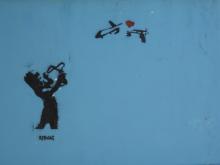
During a recent visit to Kabul’s Emergency Surgical Center for Victims of War, the staff shared with us their sense of what's happening around the country, derived from the reports of staff working at several dozen clinics and at their main hospitals in two other provinces. They described Kabul as "a bubble." They told us full-scale wars are being fought between quite heavily armed forces in both eastern and southern Afghanistan, although the news coverage that goes beyond Afghanistan generally pertains to Kabul. The groups fighting the Afghan government include various warlords, the Taliban, drug kingpins, and foreign fighters, some of whom may be strategizing ways to cut off the roads to Kabul. The Kabul “bubble” can be quite vulnerable.
The borders now vanishing in the Middle East – the most radical transformations of the map here since the post-WWI Sykes Picot agreement – are being redrawn in chaos and fear. The bubbles that burst here are the hopes for peace in a world avid for control of this region and its resources. Unfortunately, durable structures of separation and domination make it difficult for many young Afghans to fulfill their longings to connect meaningfully, peacefully, and stably with a saner world united under one blue sky.

A soon-to-be college-bound Michael Brown is shot by Missouri police, reportedly while holding his hands above himself in surrender and while unarmed. The resulting protests turn violent, leading ultimately to police setting up barricades, complete with snipers, tear gas, and flash grenades. Local stores are decimated and scores are injured in the resulting tensions.
Not long ago, Eric Garner, another African-American man, died of suffocation while being submitted to a choke submission hold by a New York policeman.
Last year in North Carolina, a black man was shot 10 times by a policeman. And all of this is in the shadow the Trayvon Martin, whose tragic and unnecessary death, is still fresh in our minds and hearts.
As cited on the Economist website , it’s enough to elicit a grim question from Delores Jones-Brown, director of the John Jay College on Race, Crime and Justice. “People are asking,” she says, “Is it open season on us?”
Meanwhile, half a world away in Iraq, ISIS continues to wreak havoc, and the United States has resumed an airstrike campaign after a decade of military force trying to maintain a tentative peace in a fractured nation. Hardly a day goes by when we don’t have reports of more Israeli and Palestinian blood spilled over the historic Gaza conflict, and Russian President Vladimir Putin continues to — in the words of a recent TIME Magazine article — “create problems only he can solve.” All the while, he stokes resentments between east and west not seen since the Cold War, seeking, too, to weaken the cohesive strength of NATO and to drive a wedge between the United States and its allies in Europe.
What’s happening to us?
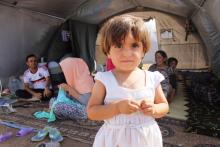
The crisis in Iraq poses two challenges — a humanitarian effort to rescue persecuted minorities, and a security mission to suppress the extremist threat posed by the forces of the Islamic State in Iraq and Syria (ISIS).
The U.S. is right to play a leading role in aiding the Yazidis, Christians, and other threatened minorities in Iraq. The immediate threat against the Yazidis has eased, but minority groups in the region remain endangered by violent extremism. The Obama administration should work through the United Nations to turn this into a genuine international rescue effort. The greater the degree of international participation and support for the aid mission, the more beneficial and legitimate it will be for the recipients.
The U.S. is also right to call attention to the threat posed by ISIS, but we need to do more to mobilize international pressure against the group. The Islamic State is in many respects more dangerous than al Qaeda. It has conquered Mosul and other major cities, taken control of dams and oil facilities, and is steadily expanding its sphere of influence in Syria and Iraq. It has formed a terrorist army with an estimated 10,000 fighters and is now armed with tanks and advanced U.S. weapons stolen from the Iraqi army. The group poses a significant threat to the security of the region and the world.

Alarm and outrage has been growing over the mounting humanitarian crisis in Iraq at the hands of the Islamic State (IS) also known as ISIL (Islamic State of Syria and the Levant) or ISIS (Islamic State of Iraq and Syria).
Christians in the region are being forced to convert, pay tribute or die as the al Qaeda breakaway group sweeps into predominantly Christian villages and Hamlets in Iraq, sending tens of thousands fleeing for their lives. Other non-Muslim groups, in particular the Yazidi, who practice a faith that predates Islam, are reportedly considered as infidels by the fanatic Islamic State and targeted for extermination in what many are calling a genocide. The U.N. is still gathering numbers but it believes that hundreds of Yazidis have been killed while others, primarily women, have been abducted and taken into slavery. Around 40,000 Yazidis have fled into the mountains of Northwest Iraq where they face the prospect of starvation on mountain or massacre by the Islamic State militants below.
The news is devastating and overwhelming. The suffering and acts of brutal violence staggers the imagination. What would a nonviolent response look like?
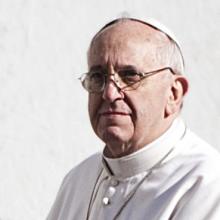
VATICAN CITY — As he dispatches a top aide to war-torn Iraq this week, Pope Francis made his most impassioned plea yet for the world to halt the “slaughter” of Christians and other religious minorities by Islamic extremists.
“The news coming from Iraq leaves us incredulous and appalled,” Francis told pilgrims in St. Peter’s Square on Sunday, as he cataloged the brutal “violence of every kind” that has driven hundreds of thousands of people from their homes and left women and children dead and dying.
“All this seriously offends God and seriously offends humanity,” the pontiff declared. “You cannot bring hatred in the name of God. You cannot make war in the name of God!”
Yet even as Francis called on the international community to find “an efficient political solution that can stop these crimes,” the Vatican also tried to make peace with the idea that U.S. military strikes that began last week were necessary and working.
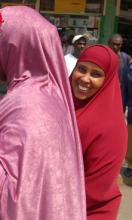
In northern Nigeria, mounting fears of militant female suicide bombers have raised calls to ban the hijab, or the veil that covers the head, chest and, in some cases, the entire body.
Last week, four women believed to be members of the Islamic militant group Boko Haram carried out attacks in Kano, a city in northern Nigeria. Men belonging to the group have taken to wearing the hijab, too, according to reports.
On July 27, a female suicide bomber detonated a bomb outside a Roman Catholic church in Kano, killing four people and injuring 70. Around the same time, security agencies arrested two girls aged 10 and 18 with explosive belts under their hijabs.
“We have this worrying situation where the bombers are turning out to be girls dressed in the hijab,” Roman Catholic Bishop John Niyiring of Kano said.
Banning the hijab is crucial to curbing the trend, said Emmanuel Akubor, a historian at Obafemi Awolowo University in Ile-Ife in western Nigeria.
“The best thing for now is to place a temporary ban on hijab, not for religious, but security reasons,” he told News Agency of Nigeria.
But Niyiring said he thinks such a ban would be resisted.

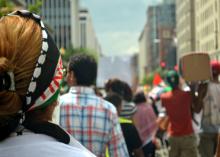
Saturday marked the third time since Israel began military operations in Gaza on July 8 that I let my voice be heard. I stood and marched alongside some 20,000 other individuals that like me have become utterly disgusted by what is unfolding in the Middle East.
A cease-fire has been struck, but as of yesterday, at least 1,800 Palestinians, most of whom are civilians, have been killed and nearly 7,000 have been wounded. Another 200,000 have been displaced in a territory whose infrastructure is now in ruins with mass power and water outages.
Despite the horrific events that have happened halfway across the world, the protest last Saturday, which took place at the White House, was a beautiful sight. Among the 20,000 protesters were Muslims, Jews, and Christians. There were blacks, whites, Arabs, Asians, and Latinos. There were women and men, both young and old, who had come from cities like Chicago, Tampa, Baltimore, and Boston. Many barriers were broken as we stood and marched in solidarity with the people of Palestine.
There were times when my heart was completely broken as I saw signs with photos of dead and mutilated bodies and others that listed the names and ages of children who had been killed by Israeli airstrikes. But in those same moments I would look across the sea of protesters draped in black, white, green, and red yelling phrases such as "Free, Free Palestine!" and "Stop the killing, stop the hate!" and I would once again become a prisoner of hope. I take refuge in the rock that is Christ Jesus. I know my God stands with those being oppressed, with those seeking justice and peace. I know my voice and prayers along with millions of others around the world will be heard.
Although I am pro-Palestine, that does not make me pro-Hamas or anti-Israel. I recognize and condemn Hamas's involvement in the failed peace talks and inability to find solutions. I also mourn equally for the loss of life on the Israeli side. However, despite the part Hamas has played in all of this I do not find Israel's actions to be justified. So I march.
SUMMER IS THE season for high school football practice. Two years ago, the players at Central Catholic High School in Portland, Ore., got a different kind of coaching, brought in by head coach Steve Pyne. For the first time, U.S. Army recruiters would serve as volunteers to run the football team through their strength and conditioning paces—helping them prepare for the annual “Holy War” matchup against archrival Jesuit High School.
According to an article in the U.S. Army’s monthly Recruiter Journal, the Army “footprint” for the big game included a Humvee parked outside the stadium and a pre-kickoff event in which local recruiters placed “unit patch decals from various Army divisions” onto players’ helmets.
“Not once at practice did we talk about the Army,” said one of the recruiters. “It wasn’t about the Army. It was about how we can integrate ourselves into the community in a way the community will accept us and not feel like we are a threat.”
In recent years, the Pentagon’s military recruiting capabilities have experienced a quantum leap—including unprecedented access to Christian high schools. Not only are military recruiters using football to gain entry into parochial schools, but they are increasingly relying on military testing in schools to access students’ private information without parental consent.
IT’S A MAY evening on the farm. My husband’s planting tomatoes and our son needs a bedtime story, but I’m completely occupied with pictures of war. I’ve cleared the piles of laundry from the kitchen table so our friend Adam can spread out his albums. There are photos of Adam in his tidy platform tent, of brown mountains in the distance, and dozens of pictures of children grinning on the other side of razor wire.
“This is an Aardvark,” he says, pointing to a gargantuan armored vehicle as he describes the flails that detonate buried mines. “What does that do to the soil?” I ask, because this is what you wonder when you and your family have been Mennonite farmers since the Reformation. There are a few more photos before I finally get it. Adam is showing me Bagram Air Base, the U.S. military hub in Afghanistan, surrounded by minefields and littered with burned-out tanks and planes, the wreckage of war from the Soviets. No one farms here, or has, or will for a long, long time.
FOR THE PAST three seasons, Adam McDermott has come to our farm in Central Pennsylvania’s Stone Valley every Friday morning to harvest vegetables for the food bank. We always chat while we bunch beets or pick green beans, and now I wonder why we’ve never talked about his years in the Army.
“This farm has definitely been part of my therapy,” he tells me, while offering a brief sketch of his months in Iraq: taking heavy equipment down unfamiliar roads to set off hidden explosives, being promoted to sergeant, and then losing three friends when a bomb shattered their Humvee. Adam came home in 2008 with Post-Traumatic Stress Disorder (PTSD) and an alcohol addiction. “A lot of guys struggle with alcohol,” Adam says. “In the military you have camaraderie and a sense of purpose. But when you get back, there’s just this big void.”
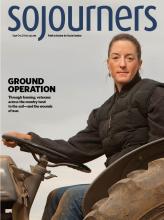
THE WARS IN Iraq and Afghanistan have led to an unprecedented number of veterans with post-traumatic stress. Experiencing the horrors of combat leaves wounds to body and soul that do not easily go away. The demons of deaths seen or caused are always ready to haunt, and too often alcohol or suicide becomes the way out. While the wars may end, their effects linger.
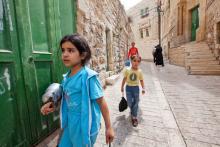
In the Judeo-Christian tradition, God calls us to love and show compassion to the stranger, particularly those who suffer. But first, they must become real to us. And there is nothing more viscerally real, perhaps, than the face of a dead child.
Is it possible to let our hearts by broken by the dead children of our enemy? Is our God big enough to allow us to imagine that God loves those we fear and despise?
Not until, I believe, they have faces.
Iraq, Syria, Ukraine, Israel, Gaza – though religious fervor is alive and well in these embattled areas, loathing, horror, and hatred seem to reign, darkness to rule. In the grim night, we cannot see each other’s faces.
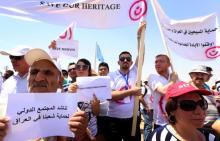
When I first saw Americans joining in solidarity with Iraqi Christians through the #WeAreN hashtag and protest campaign, I was encouraged. Our team at Preemptive Love Coalition had been sounding the alarm about the targeted persecution of minorities in Iraq through private emails and social media messages for weeks, in between making urgent appeals in our effort to provide lifesaving heart surgeries for children amid the violence.
Most of our efforts were largely unsuccessful before the “Islamic State” gave Mosul’s Christians an ultimatum to (1) convert to Islam; (2) pay a submission tax; or (3) “face the sword.”
After Islamist militants began marking the homes of Christians in red paint with the Arabic letter “N” (Nazarene) for extermination or expropriation, we tried again to use our proximity to the problem in Iraq to provoke our friends in America to pay attention by tagging a photo “#WeAreN,” in which I had symbolically marked myself with an Arabic “N.”
But it was not strictly an act of solidarity with Iraqi Christians. We had the targeting of Turkmen, Yezidi, Shabak, and even Sunni Muslims in view, as well. #WeAreN was more about the marking of Christians; less about the marking of Christians.
Muslims and minorities across Iraq immediately sensed the gravity of the tactics deployed by the Islamic State: if one group is marked, we are all marked. If we stand by in silence today while others are marked for extinction, our time will come, and there will be no one left to stand for us.
In response, Muslims across Iraq joined together in protest, prayer, and viral photographs saying “We are Iraqi. We are Christians.”
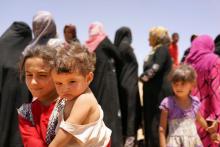
The horrible human costs and increasing danger the world is now facing in Gaza, Ukraine, and Iraq show the consequences of not telling the truth. And unfortunately, we seem to mostly have political leaders who are unwilling to admit the truth of what’s happening, deal with root causes instead of exploiting symptoms, and then do everything possible to prevent the escalation of violence and further wars. Instead we have politicians who are mostly looking for opportunities to blame their political opponents, boost their own reputations, and protect business interests. As people of faith, we are called to speak the truth in love.
It’s time for some truth telling.

“The final perversion is the reversal of who is the real victim here: the commander of a military base whose drones kill innocent people halfway around the world, or those innocent people themselves who are the real ones in need of protection from the terror of U.S. drone attacks?”

Some called it “The Great War.” Others called it “The War to End All Wars.” History proves it was neither.
As the world marks the 100th anniversary of the outbreak of World War I — a conflict that left 37 million dead or wounded and reshaped the global map — a number of scholars and authors are examining a facet of the war they say has been overlooked — the religious framework they say led to the conflict, affected its outcome and continues to impact global events today.
More than that, they argue, today’s religious and political realities — ongoing wars, disputed borders and hostile relationships — have their roots in the global conflict that began when Austria-Hungary declared war on Serbia on July 28, 1914.
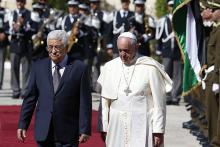
As Israel continued its ground offensive into the Gaza Strip, Pope Francis urged Israeli President Shimon Peres and Palestinian President Mahmoud Abbas to end the spiraling conflict.
The pontiff telephoned the two leaders on Friday to express “his very serious concerns” only six weeks after both me joined him at the Vatican for an historic prayer meeting.
Francis said he was concerned about the “climate of growing hostility, hatred, and suffering” that was claiming many victims, resulting in “a serious humanitarian emergency”, the Vatican said in a statement.


“If, as Christians, we believe that peace is rooted in Christ, then how we build that peace within us, in one way, is through the disciplines of solitude and silence; through spending time with God. Solitude is not necessarily extremely easy process, because it will bring to the fore all sorts of things that are within us. We will get to know ourselves in a fuller way. In solitude, where you know that God is with you, you can just be with God, and there is no need for a mask. Also, your humility might grow because you will see yourself as you really are — in a way that needs to be healed and transformed.”